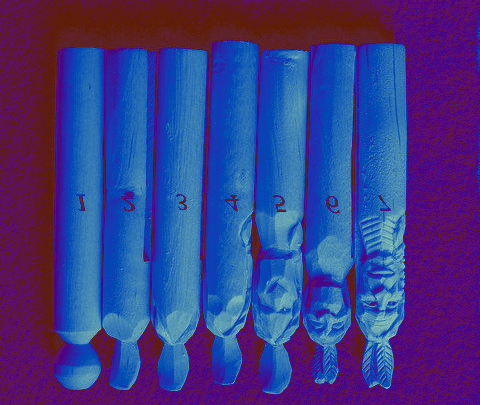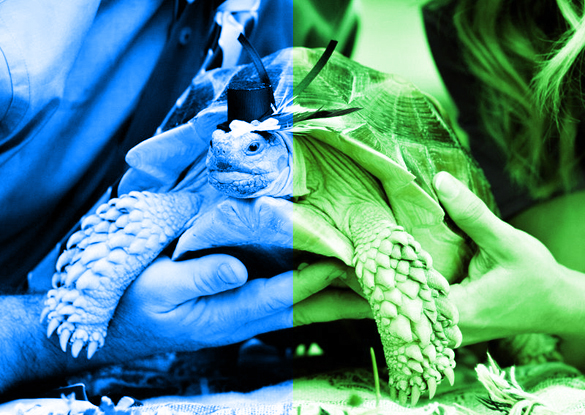Aranciata you Glad I Didnt say Banana
SEAN BLUECHEL,
EAMON ORE-GIRON &
ZACH ROCKHILL
April 30 - May 31, 2016
curated by Harriet Salmon, Jason Tomme & Ana Wolovick
Press Release:
“God doesn’t make orange juice, God makes oranges.” – Jesse Jackson
The three artists have decided that the show should be a single task, and as specific, literally and figuratively, as possible: “Make an orange”.
When deeply pointless, assignments sometimes deliver pay-offs when you least expect them. Seen against earlier impulses in Bluechel’s work towards directive artwork, such as commissioning paintings with strict parameters by untrained artists, the invitation can be assumed to be both a cognitive irritant and subversive gift.
Directions allow for the ‘hand’ to function not through physical abundance but rather through psychological diversity.
The terms are agreed upon, individual interpretation is inevitable.
Sean Bluechel
Born1969, Lives and works in upstate N.Y.
Zach Rockhill’s work includes performance, video, drawing, photography, and sculpture, and has been shown at The Drawing Center, PS1 MoMA, the PERFORMA Biennial and the Venice Biennale. He lives and works in Brooklyn, NY.
Eamon Ore-Giron (b. 1973) received a BFA from San Francisco Art Institute (1996) and an MFA from the University of California, Los Angeles (2006). He has had solo exhibitions at LAX ART, Los Angeles (2015); Nicelle Beauchene Gallery, New York City (2014); MUCA ROMA, Mexico City (2006); Queen’s Nails Annex, San Francisco (2005) and Pennsylvania Academy of Fine Art, Philadelphia (2005). His work has been included in group shows at the Yerba Buena Center for the Arts, San Francisco; the Los Angeles County Museum of Art; the Museo Rufino Tamayo, Mexico City; Prospect 3, New Orleans; the Perez Art Museum, Miami, and Deitch Projects, New York. OreGiron’s work has been covered in The New York Times, Art Forum, ANP Quarterly, and SFAQ, among other publications. Eamon OreGiron is based in New York and Los Angeles.
JASON TOMME INTERVIEWS SEAN BLUECHEL ABOUT
“ARANCIATA YOU GLAD I DIDN’T SAY BANANA”
(April 2016)
JT: This show came about from a “directive.” In this case the directive was to “make an orange.” What’s your history in working this way?
SB:The first directives with my own work started in the late 90's, 98-99. I did a piece where I asked 100 plus strangers on the street to draw a dog on pieces of paper I had torn into little squares. Then I took the pieces and placed them in a pile and called it "Dog pile." It becomes a fun one-liner that I think is valuable in keeping one’s practice from falling prey to sacred or overly heavy associations. I did a few more like this and then nothing, until a couple years ago when I started asking "outsider" artists who I was buying work from on eBay to paint their interpretation of the same sentence. The first sentence was "Paint a dolphin jumping out of the water holding a sword." Again, like the dogs it is somewhat irrelevant. But like any singular thing interpreted by many, it takes on a necessary distance which ultimately produces a kind of intimacy in the end. I’m currently gathering these and others sentences to then hopefully show in groupings as single works. I'm also doing more sculptural directives with my gallery in Paris (Galerie Joseph Tang) where I email Joseph directions every few days which will result in a show next month. It is really about a kind of abandonment of the hand and testing one’s need of involvement. Can an exactitude be obtained by letting go?
JT: Any thoughts on why this is an interesting way to work?
SB: For me the interest is in the abandonment of it all, because I very much need to be in control and do things myself . Finding these ways out of your own sense of correctness and embracing an aspect of “other” by way of merely pointing or allowing, is exciting. For the most part, I will be seeing the show in Paris for the first time, along with the public. I think again, that this distance allows for a kind of closeness or intimacy, that is different or even more critical than the usual way of making things. I think it’s very hard to walk into your studio and look and critique your own work as if you were looking at someone else's work. But this is a very valuable practice and the directive work, I think, plays with extending this methodology.
JT: So can anybody can create a directive?
SB: Yes, anybody can do anything, but that does not mean it's good or that it works. I mean, when my toilet breaks I call a plumber not a tennis pro. I believe the making of art is no less or more valuable than plumbing. Actually it's less! I very much need my pipes flowing. Art is a unique thing, and due to debates over value, emotions can get worked up. Why is this good versus that? Why is that guy and that work making millions and this work isn’t? All of that is a different game, a market game, and although it is very very hard to step away and not be affected by it, it has nothing to do with good, bad etc. Like I mentioned, I have been buying paintings on eBay for around a year now and I get amazing little paintings for 10-20 bucks. Most of it is crap but you can’t just dig for gems, you have to also be competent so you can identify one when found. Everybody can dig, but like an old professor of mine Paul Kos would say, "I have no idea what good art is but I definitely know what bad art is."
JT: Once the play on oranges became a thing, was it pretty straight forward from there?
SB: I wanted initially to do a collaboration on a single work. But it was problematic to give the time needed because both Zach And Eamon live in the city and I'm upstate. The one time we got together upstate it was more of a good time having some drinks, giving shit to each other and then OK, we have to do something. The directive aspect was brought up and it was agreed upon pretty quickly to do three interpretations of a single thing.
JT: You make beautiful things fucked up, and vice versa. You also have amazing craft. This show started with an idea, perhaps a non sequitur(?), that lead to a certain craft-based solution. Is that normally how your projects evolve?
SB: Amazing craft hahahhahaha. I can't make shit. It's fucked up beautiful maybe, because I embrace that sensibility, but it's only because I couldn't make a box if you paid me. The "craft" in regards to the oranges was more of a position. It's not an interpretation though this is inevitable. It's let’s each make an orange! For me this is needed in the directives. The variables will always be individual, different etc. How can you corral this so that it lends itself (by the corralling) to not just independence, but a greater transitory shift? I told my girlfriend Mika that I bet you Eamon and Zach put mold on their oranges. I did, and I viewed it is a natural move. Mold embodies more aliveness of a dead dead object. In the end only Eamon added mold, but that to me was very interesting.
JT: How did you guys decide on how to install?
SB: Well we all brought our orange and said o.k show me yours, I'll show you mine. We put them on the ground to take a look. We tried a few placements, but with such quiet work it is very dangerous that it might fall into a dismissive contrivance. They stayed almost exactly where we put them for us to initially just look at them in the space. With work like this you can't overthink it or try too hard. It works where it works.
JT: People often make fun of how "orange" Donald Trump is. Artists are sensitive and absorb all sorts off stuff. A bridge too far?
SB: It’s your bridge. I think if I made that bridge it's time to jump off. Trump is orange but I am not a strong believer in politics being in the front of a work. I think the sheer act of waking up and trying to create funny, intelligent work is as political as any flag waving. Plus I haven't seen anything as perfect and as political as David Hammond's Blizzard balls. If you care about issues and are invested in being aware of what’s going on in the world, that will be in your work. How far you push that, show that, embrace it is up to each artist. It's who you are on a daily effort without yelling on a street corner. I'm amazed most people care about some "political issues.” People need to embrace more hobbies, getting out of their own world. There are many worlds! But yeah we can retitle the show " Hump Trump" if you want.
JT: Any new work ideas triggered from this collaboration?
SB: None I can think of except I very much want to try collaboration in more areas or with more people whose work I very much respect. I wish I would have contacted some of my heroes before they passed and started a simple dialogue. I think we tend to, or I do at least, place certain people on this unreachable pedestal. There are plenty of people I would love to just fool around with in the studio. But everyone has their own gig. It's hard to find the right momentum and abandonment to bare fruit.















